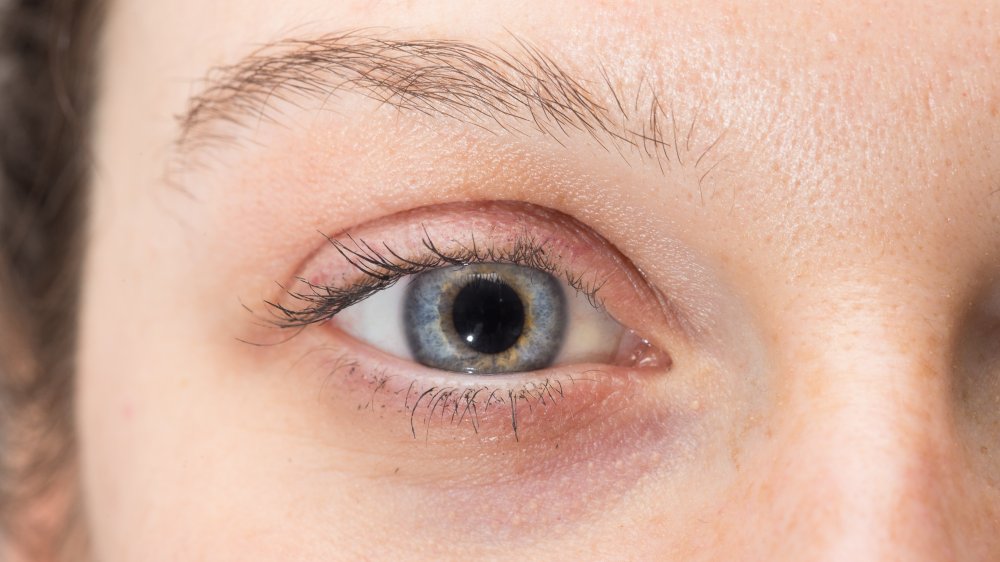When You Have An Orgasm, This Is What Happens To Your Body
Having an orgasm can be one of the most satisfying and gratifying experiences for the human body. Plus, there's really no "wrong" way to achieve the Big O — as long as everyone involved has given their enthusiastic consent, of course. You do you!
Where things really start to get interesting is when you get all hot and nerdy about anatomy, as some pretty fascinating things happen within when you have an orgasm. Whether you're well-versed in the language of la petite mort or are here because you want to learn more about this pleasurable experience, you're bound to learn something new. Yes, the human body really is capable of some amazing things — including this unique physical sensation. According to Medical News Today, orgasms have "multiple potential health benefits."
So, are you ready to learn what really happens to your body when you reach that oh-so-lovely pleasure peak? Health Digest consulted the experts, and this is everything they had to say.
Your breathing and heart rate will increase when you have an orgasm
The most obvious thing that happens to your body when you have an orgasm is, of course, the feeling of extreme pleasure in your nether regions. Wherever the orgasm occurs in the body, it just feels darn good, according to sexologist Dr. Jess O'Reilly. "As pleasure builds toward orgasm, you'll likely notice that your breath and heart rate increase, and tension builds in the genital region (and possibly the thighs)," she told Health Digest. "During orgasm, all of this tension is swiftly released." It's that last bit that really brings the pleasure to a fever pitch, when everything goes whoosh.
Since all bodies are different, everyone will react differently when orgasming, according to O'Reilly. Some may scream while others may "simply exhale deeply," she continued. "What most share in common is the sudden release of tension." What a wonderful and mysterious experience it is, too.
Having an orgasm increases your happy hormone levels
The release of tension that happens during the climax of an orgasm is responsible for those, well, orgasmic feelings where the orgasm actually occurred. However, having an orgasm doesn't just happen in the body part of your choice. In fact, there's also a lot going on up in your brain, according to Mia Sabat, a sex therapist at Emjoy.
"The brain releases many beneficial hormones during orgasm, including: dopamine, often referred to as the happiness hormone; endorphins, the body's natural pain relievers; and oxytocin, also known as the love hormone," she explained to Health Digest. "All of these hormones are beneficial to your brain and body in many ways, as they collectively boost your overall wellbeing."
That's why you feel so giddy and cuddly after you have an orgasm, and might even feel like you just can't stop smiling. It's no wonder, considering a hormone cocktail is essentially coursing through your system!
You experience neurochemical changes when you have an orgasm
In addition to the release of tension and the flood of serotonin, dopamine, and oxytocin, your brain has another job to do after you experience the big O, as noted by sexual psychologist Dr. Nicole Prause. "When humans orgasm, there appear to be three notable neurochemical changes," she revealed to Health Digest. "Prolactin goes way up, vasopressin goes up, and ghrelin comes back from being suppressed during sexual arousal."
So what does the fluctuation of these chemicals do to your blissed out bod? Quite a bit, says Prause. "These changes may cause feelings of satisfaction (prolactin), sleepiness (vasopressin), and hunger (ghrelin)," she continued. That's why you may experience what Prause calls the "sleepy vs. sandwich war" after you climax; depending on which hormone hits the hardest, you'll probably immediately want to take a nap, head to the kitchen for some grub, or pass out after mowing down some food. Either way, you can thank your orgasm for all of it.
When you have an orgasm, your pain sensitivity decreases
When you have an orgasm, it's pretty difficult to think about anything else, given the amount of pleasure you're experiencing. In fact, as your pleasure increases, something else decreases. "During an orgasm your sensitivity to pain significantly decreases due to the release of happy/love hormones such as oxytocin, endorphins, and vasopressin released by the pituitary gland," Dr. Margarida Rafael, a licensed psychologist and a relationship and sex expert, shared with Health Digest. "This helps explain the relationship between pain and pleasure, and why pain is not felt as strongly during arousal and orgasm." Looks like some of those hormones are serving double duty, too.
But wait, there's more. If you're someone who suffers from chronic pain, you may just want to consider having more orgasms. "A few studies have shown that the release of these hormones, particularly endorphins and oxytocin, help reduce chronic pain conditions such as chronic migraines and cluster migraines," Rafael continued. That's great news for anyone who's looking for any possible way to mitigate those types of pain.
Women will have multiple muscle contractions upon orgasm
Okay, this one's for the ladies. As you may or may not know, women are capable of having several different kinds of orgasms, sometimes simultaneously, as noted by Healthline. Additionally, women can sometimes have multiple orgasms, which is a pretty nice bonus if you're lucky enough to experience them.
When it comes to having the more elusive vaginal orgasm, not only will this kind put you in, essentially, an altered state of consciousness, it will also cause your muscles to react, says Dr. Kim Langdon, an obstetrician-gynecologist. "It's usually accompanied by involuntary, rhythmic contractions of muscles surrounding the vagina, often with associated uterine and anal contractions," she told Health Digest. "It also increases muscle tone throughout the body that resolves the feeling of well-being and contentment."
Of course, not all women will experience these contractions for a variety of reasons, as no two bodies are alike. Plus, not all women have vaginas. But for those who do climax in this way, it's a positive experience.
Your pelvic floor muscles will wake up when you have an orgasm
You may not have given much thought to your pelvic floor — especially if you're a male or if you're young and relatively fit. But if you're a bit older, or you've given birth to a baby, chances are the health of your pelvic floor is definitely on your radar, as noted by the BBC.
A healthy pelvic floor can actually play a huge role in your orgasms, according to Heather Jeffcoat, a physical therapist and pelvic health expert. "Your pelvic floor muscles contract when you have an orgasm," she explained to Health Digest. "Stronger pelvic floor muscles are correlated with forceful expulsion of vaginal fluid during orgasm." She added that those muscles also impact the length and intensity of your orgasm.
That's not just good news for women, as Jeffcoat says there's another benefit your pelvic floor provides during an orgasm. "The pelvic floor is involved in enhancing sexual pleasure for both partners through muscle activation and vaginal ballooning," she continued. Yes, it can also feel pretty nice for the male partner in a heterosexual relationship.
Men and women may experience this during an orgasm
"Orgasm and ejaculation often happen simultaneously, but they're actually two separate events that don't necessarily have to happen at the same time," Healthline explained. Not all men have this experience, and non-ejaculatory orgasms are not uncommon.
Women can have a comparable experience, known as female ejaculation, according to urologist Dr. Michael Ingber. One-third of women may experience this during orgasm, according to the expert. However, Dr. Kim Langdon, an obstetrician-gynecologist, explained that fluid expulsions (FE) aren't a typical part of the female orgasm. They're "two different physiological components of female sexuality," she told Health Digest. "FE was objectively seen in tens of cases, but its reported high prevalence is based mostly on subjective questionnaires." Plus, the phenomenon has rarely been scientifically documented.
As Healthline highlighted, "Try to remember that in sex — just as in life — it's about the journey, not the destination. Some people ejaculate. Some don't. Either way, it's important to enjoy the ride!"
There's a reason you make that face when you have an orgasm
If you tend to have orgasms when you're by yourself as opposed to with a partner, you may not think about the kind of facial expressions you make in the moment. But if you're more likely to climax with a partner or partners, you may be more aware of your "O-face." Some of you may have even heard about it from your partners — hopefully they're being complimentary, or at least gentle, as that might make you feel a bit bashful.
As it turns out, though, you're not being silly when you find yourself making that face. That's because there are all kinds of things happening in your brain when you have an orgasm, as noted by board-certified sexologist and sex therapist Jessica Cline. "That O-face, which is similar to the face you make in pain — like stubbing your toe — is due to activity in the anterior cingulate cortex and the insular cortex responding to pleasure," she explained to Health Digest. "This is the same part of the brain that processes pain." Certainly pleasure is the preferable option!
You may hold your breath when you have an orgasm
You might have heard that certain kinds of breathing exercises can affect your intimate experiences, a fact that was noted by Self. To that end, you may find that focusing on your breathing can help you have more powerful sensations in the bedroom — in a good way. "Training yourself to breathe deeply and naturally can enhance your sexual experience," sexologist Jessica O'Reilly confirmed to Self.
Additionally, you may find that your breathing changes when you have an orgasm on a subconscious level, according to sexologist Robert Thomas. "It is quite common that ahead of climax, the breathing builds up to a rapid pace," he shared with Health Digest. "Right before or during an orgasm, though, people tend to hold their breath for a few seconds."
But fear not! Thomas says this is a totally natural inclination. "We hold our breath because the diaphragm clenches rhythmically along with all the other muscles that tense and relax during climax," he continued. So if you find yourself doing this, you're definitely not alone. You might notice your partner doing the same thing, too!
Fears and anxiety reactions are gone when you have an orgasm
It seems like now more than ever, it can be pretty tough to relax. You may be juggling multiple responsibilities to the point that it can feel like you're spinning plates. Who has time to start a serious meditation practice, anyway?
Fortunately for folks who are sexually active, there's a hidden benefit to having regular orgasms. It turns out that they can seriously calm you down, according to Dr. Margarida Rafael, a licensed psychologist and a relationship and sex expert. "The areas responsible for decision making and reasoning (lateral orbitofrontal cortex) become less active and almost shut down, meaning that fears and anxiety reactions are gone during the time of orgasm," she told Health Digest. "Consequently, the body reaches a relaxed state that is uncommon during regular 'waking states.'"
As TalkSpace explained, "Sex is a kind of temporary escape from the stresses of everyday life. ... What better way to practice mindfulness than sex?!" Yes, unless you're able to spring for a tropical spa getaway, having an orgasm or two might just be a soothing balm for your anxiety.
You will feel less inhibited when you have an orgasm
Have you ever found yourself in bed with someone and, upon orgasm, they shout out something super odd? Or perhaps you yourself have been the person to suddenly blurt out desires that you would usually keep to yourself? If you said yes to either one of these question, we hope that whatever comment was spoken was well-received by each party.
And hey, if worse comes to worst, you can always blame science. That's right, having an orgasm may make you more inclined to open up about what you're really thinking about, according to urologist Dr. Jessica Lubahn. "The part of your brain in charge of thinking and reasoning logically also temporarily shuts off, which is why you may feel disinhibited," she told Health Digest. So as long as everyone involved is cool with your kinks, you shouldn't have anything to worry about.
Sometimes, though, you or your partner may say the big ol' "I love you" — even if that's not totally how you/they feel. "When people have sex, this creates a whole cascade of neurotransmitters," Psychologist Daniel J. Kruger, told Vice. He continued, saying, "So basically, in that moment, you might actually feel it, right? You might actually feel it. ... When you're in that moment of bliss, it's all [you] can experience."
When you have an orgasm, your toes may curl
Clearly your brain does a lot of heavy lifting when you have an orgasm, as it's in charge of distributing all of the hormones and chemicals that flood your system. But in addition to that, the way your brain is structured can trigger other reactions in your body, physical therapist and pelvic health expert Dr. Heather Jeffcoat revealed to Health Digest. "Our brain is not organized from the top down, nor is their a clear line where one body region begins and one ends in the brain," she explained. "Your toes curl because the genital area is next to the toes in the brain." Isn't that wild?
So, what exactly is going on in your noggin to bring about this strange particular movement? "There is overlap of the nerves, which in turn creates an overflow of muscle function, thus toes curling during the pelvic floor muscle contractions that occur during an orgasm," Jeffcoat continued. Sometimes, the human body can be endlessly fascinating!
Your pupils will dilate when you have an orgasm
Believe it or not, but you just might be capable of having an orgasm so powerful that it can cause temporary blindness! In fact, that was the case for a British man who, upon going to the doctor with impaired vision in his left eye, learned that the cause was the "vigorous sexual intercourse" he had the night before, as noted by the New York Post. For real? Indeed.
"During orgasm the valsalva manoeuvre [holding your breath to prevent an orgasm] can produce a sudden increase in retinal venous pressure resulting in vessel rupture and haemorrhagic retinopathy," explained the British Medical Journal (via New York Post). In other words, the pressure buildup in the retina from the man's climax burst a blood vessel in his eye, causing temporary blindness.
However, that is pretty rare occurrence, so chances are your vision isn't going to be an issue after your next orgasm. You may, however, notice that your pupils dilate when you have an orgasm, according to obstetrician-gynecologist Dr. Kim Langdon. That's much more common, and yet biometrics expert Stuart Steinhauer told Scientific American that "nobody really knows for sure" why this happens. It just does.
Your skin may flush when you have an orgasm
Having an orgasm really does have a significant impact on many parts of the body, showing just how intense this body function can really be. That would explain why we're so preoccupied with sex, as noted by Psychology Today.
Having an orgasm can even have an impact on your skin, according to sexologist Dr. Carol Queen. "You may experience a 'sex flush' which can be seen on the chest, on the face, and in fact may result in genital skin color becoming brighter or darker (this can depend on the person's skin tone, of course)," she told Health Digest. "This happens because of the increased blood flow of high arousal and orgasm."
So if ever you've heard that you're glowing while in a state of post-coital bliss, that would be why. Truly from top to bottom, having an orgasm can be a transformative experience for your mind and body.















